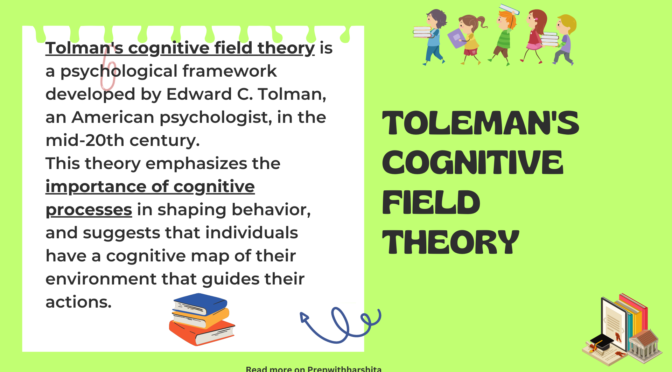Toleman’s cognitive field theory is a psychological framework developed by Edward C. Tolman, an American psychologist, in the mid-20th century. This theory emphasizes the importance of cognitive processes in shaping behavior, and suggests that individuals have a cognitive map of their environment that guides their actions.
According to Tolman, cognitive maps are mental representations of the environment that individuals create based on their experiences and interactions with the world around them. These cognitive maps influence behavior by providing a framework for decision-making and problem-solving.
Tolman’s cognitive field theory suggests that behavior is influenced not only by environmental stimuli, but also by an individual’s goals, needs, and expectations. These factors are thought to create a “cognitive field” that shapes behavior in a particular situation.
For example, if a person has a goal of finding a particular location in a city, their cognitive map of the city will guide their behavior and decisions. They may use landmarks or other cues to navigate to their destination, and their cognitive map will help them adjust their behavior if they encounter unexpected obstacles.
Toleman’s cognitive field theory has been influential in the field of psychology, particularly in the areas of cognitive psychology and learning theory. It emphasizes the importance of understanding individuals’ cognitive processes and mental representations of the world in order to understand their behavior.
Also Read: Kohlberg’s theory of Moral Development
Toleman’s cognitive field theory is a psychological framework that emphasizes the role of cognitive processes in shaping behavior. Some of the key characteristics of this theory include:
- Cognitive maps: Tolman believed that individuals create mental representations of their environment, which he called cognitive maps. These maps guide behavior by providing a framework for decision-making and problem-solving.
- Cognitive fields: Tolman suggested that behavior is influenced not only by environmental stimuli, but also by an individual’s goals, needs, and expectations. These factors create a “cognitive field” that shapes behavior in a particular situation.
- Learning: Tolman believed that learning occurs through the formation and modification of cognitive maps. When individuals encounter new information or experiences, they may adjust their cognitive maps to accommodate this new information.
- Purposive behavior: Tolman argued that behavior is goal-directed and purposive, rather than simply a response to environmental stimuli. Individuals use their cognitive maps to navigate their environment and achieve their goals.
- Mental processes: Toleman’s theory emphasizes the importance of mental processes, such as perception, attention, and memory, in shaping behavior. These processes influence how individuals interpret and respond to environmental stimuli.
Overall, Toleman’s cognitive field theory emphasizes the importance of understanding individuals’ cognitive processes and mental representations of the world in order to understand their behavior.

Also Visit: Prep with Harshita


BEST PRIVATE PROXIES – Elite top quality, Almost limitless bandwidth, 1000 mb/s superspeed, 99,9 uptime, Low sequential IP’s, Basically no use laws, A number of subnets, USA and even European union proxies – Get At this moment – DreamProxies.com